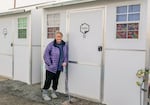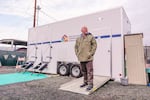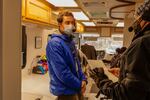
Kathryn Perkins poses outside a tiny home she lives in at a non-congregate homeless shelter located in The Dalles on Dec. 13, 2022. Perkins, who is currently experiencing homelessness, has lived at the shelter for six months with her dog, Monster, while trying to transition to permanent housing.
Sheraz Sadiq / OPB
Kathryn Perkins never imagined she would experience homelessness.
“I was always a working member of society. And then all of a sudden I’m not, and you know, I’ve had some bad times,” she said.
For the past six months, Perkins has been staying in a 64-square-foot tiny home which she shares with a roommate and her dog, Monster.
The tiny home is one of 18 identical units overlooking the Columbia River nestled together inside a fenced-off area in The Dalles, roughly a mile from the port in an industrial section of town. Thirty adults, including Perkins, are currently staying at the site which serves as the only homeless shelter in all of Wasco County.
The non-congregate facility is operated by Mid-Columbia Community Action Council, a nonprofit organization providing housing assistance, outreach and other services to unhoused clients in Wasco, Hood River and Sherman Counties.
Perkins was facing eviction from a home in Hood River where she was renting a room when a community health worker helped her secure a spot at the shelter in The Dalles. She said that the experience has ultimately been a positive one, helping her to dispel misconceptions she had about people experiencing homelessness.
“I just had in my head what it meant to be homeless when you drive down the freeway, you know, and you see homeless camps or just homeless people,” she said. “But then you realize there are degrees, too, of homeless people. … Quite a few people that are here work.”
Perkins is 64 years old and unable to work because of a stroke she suffered years ago. She said she receives $900 in Social Security and disability benefits each month.
“I’ve always been able to manage having my own home and all of that, but the rents are just astronomical,” she said.

"Think Out Loud" visited the only shelter facility in all of Wasco County on December 13, 2022. The facility consists of 18 tiny homes nestled together in a fenced off area in The Dalles. Each of the homes is 64-square-feet and can accommodate two adults, with space for two beds and some shelves.
Sheraz Sadiq / OPB
Residents typically stay up to six months at the shelter facility, according to Kenny LaPoint, executive director of the Mid-Columbia Community Action Council. Case workers help unhoused clients like Perkins fill out paperwork and put their names on waitlists for apartment rentals which federal housing vouchers can help pay for.
“Since the beginning of this year, we’ve placed over 60 people into permanent housing from this site,” LaPoint said.
MCCAC will also break ground in the spring on a new navigation center located north of The Dalles’ downtown on a donated 2.6-acre parcel of land. The tiny shelter homes will be relocated to the new site, which will also include office space for seven community-based organizations offering employment assistance, behavioral healthcare and other wraparound services.
“We believe if we can sort of provide this one-stop shop in rural Oregon, it will create better access for folks who are experiencing homelessness or housing instability or just poverty generally,” LaPoint said.
In January, MCCAC will conduct a federally mandated Point-in-Time census of people experiencing homelessness in Wasco, Sherman and Hood River Counties. A count conducted this past January revealed 194 people experiencing homelessness in Wasco County.
That survey may also have been a more accurate reflection of the unhoused population in Wasco and neighboring counties compared to counts conducted in previous years.
“We partnered with a couple of culturally specific organizations to ensure that the Latinx community and the Native community were counted… and historically, those communities were not counted well,” LaPoint said.

Kenny LaPoint, executive director of Mid-Columbia Community Action Council, stands outside a restroom and shower trailer at a homeless shelter facility in The Dalles on December 13, 2022. Mid-Columbia-Community Action Council is a nonprofit organization that operates the shelter and provides other services to people experiencing homelessness in Wasco, Hood River and Sherman Counties.
Sheraz Sadiq / OPB
Getting a clearer picture of the unhoused population in the Columbia River Gorge may also help better target resources such as substance use counseling and treatment recovery.
No drugs or alcohol are allowed at the shelter in The Dalles. LaPoint defended the policy as a way to ensure the safety of unhoused clients, shelter staff and neighbors.
“If we were to say, ‘You could actively use drugs on our site,’ we would potentially cause a barrier for somebody who is maybe trying to overcome years of drug abuse,” LaPoint said. “And we don’t want to create barriers for others by removing barriers for some.”
“I think the sort of new era of meth and the increased use of fentanyl is having a significant impact, particularly on those who remain unsheltered,” LaPoint said. “And that is probably the biggest community issue that our elected officials deal with on a day to day basis.”
MCCAC partners with another local service provider, Mid-Columbia Center for Living, to offer substance use and mental health counseling to people experiencing homelessness.
Another provider, One Community Health, is helping fill the gap in medical care for underserved, hard-to-reach communities in the Columbia River Gorge.
Every Tuesday morning, a mobile medical clinic from One Community Health drives from Hood River to The Dalles and parks outside the shelter entrance. Inside the RV is an exam room, ultrasound machine, blood pressure cuffs and other equipment to screen for heart disease, cancer and diabetes. It’s also stocked with vaccines for COVID-19, the flu and other illnesses.

Middy Tilghman, a family nurse practitioner at One Community Health, talks to "Think Out Loud" host Dave Miller inside a mobile medical clinic on December 13, 2022. The clinic travels each Tuesday morning from Hood River to The Dalles to provide free services to unhoused patients, such as diabetes and cancer screenings.
Sheraz Sadiq / OPB
Middy Tilghman is a family nurse practitioner and the lead medical provider at the clinic.
“We live in a big rural area and it’s really hard for some of our community members to get to care. … So the idea is that we’re going out and connecting people with care to reduce barriers,” he said.
Bringing medical services to people experiencing homelessness not only results in improved patient outcomes, it also eases the strain on emergency departments where they would otherwise go for their care.
“It’s pretty well documented that by reaching out to community members who don’t have a great connection to the health care system or are interested in the health care system but can’t do it for certain reasons, you drive down emergency room visits,” Tilghman said.
“That’s really important for the patients because they get better care, they get what they need instead of going to the emergency room… and that’s a real drain on resources when you live in a small rural community and the hospital is working really hard just to survive.”
Tilghman said the mobile clinic gets a mix of regular and new, unhoused patients as people leave the shelter and transition into permanent housing. But as patients come and go, he has seen firsthand how the community coalesces to look out for one another.
“I certainly sometimes get internal referrals from the homeless community where they’re like, ‘Hey, have you seen so and so? You need to go check on them. They’re not doing the way they should be,’” Tilghman said.
That sense of community and the unexpected friendships sparked at the shelter have helped Perkins overcome feelings of worthlessness and the uncertainty looming over her next move.
“I met some very cool people here, I really have. People that I hope that I never lose contact with,” she said.
Kathryn Perkins, Middy Tilghman and Kenny LaPoint spoke to “Think Out Loud” host Dave Miller. Click play to listen to the full conversation:
